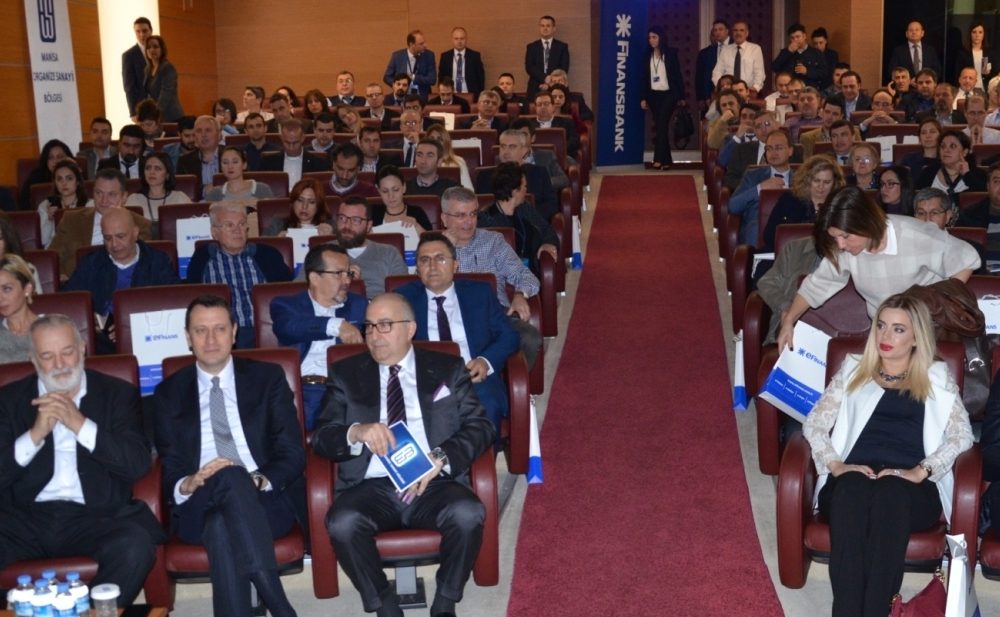In cooperation with Finansbank Manisa Organized Industry Branch and our Region, a talk on “Developments and Risks in the World and Turkish Economy” was held at the MIP Conference Hall, where Economist Deniz Gökçe participated as a speaker.
Sait Türek, Chairman of the Board of Directors of Manisa Industrial Park, who made the opening speech, stated that the industrialists had a difficult year economically due to the currency-parity difference, that 2016 would not be easy, however, with their belief in industry and export performance, they expect a growth above the targets. “In order to meet these expectations of our industrialists, we try to do all kinds of services that fall on us. Within the scope of these works, our receivables arising from the infrastructure services of our Region will be guaranteed by the bank, DBS limits will be defined at Finansbank for our participants operating within the borders of our Region and who want to enter the Direct Debit System, so that even if their accounts are not available on the payment day, our companies will be debited to the bank and the payment will be made to our Region, With the belief that the advantageous products and services to be offered by the relevant bank will provide affordable financing to our industrialists, and most importantly, it will contribute positively to the competitiveness of our industrialists, and in order to save our companies from the burden of letter of guarantee commission; We signed a one-year Direct Debit System (DBS) protocol with Finansbank Manisa Organized Industry Branch.” said.
Stating that they believe the system will make a positive contribution to their competitiveness by providing low-cost financing to industrialists, Türek said, “We believe that this work we carry out with Finansbank, one of the largest banks in Turkey, will minimize the operational workload and financial losses of our companies. On this occasion, I hope that our cooperation will be beneficial.”.
Finansbank Deputy General Manager Ömer Tan evaluated the year 2015 as Finansbank and said, “Our net profit in 2015 was 706 million TL. The process of changing our bank’s main shareholder to QNB, which operates in 28 countries and is a global bank with an asset size of close to 150 billion USD, is currently in the evaluation process of the relevant public institutions.”
In her speech, Işıl Zeynep Atamdede emphasized the advantages of the Direct Debit System agreement with Manisa IP for our Industrialists. Atamdede said, “As Finansbank Cash Management, we aim to contribute to the more efficient management of the IP’s cash flow by enabling Manisa IP members to make their payments to the IP through the Direct Debit System (DBS). BDS; It ensures that the receivables of Manisa IP members who will be included in this system are automatically collected on the due date, with the guarantee of Finanbank.”
Economist Deniz Gökçe, on the other hand, shared the situation of the world and Turkey’s economy and his future projections with the participants with graphics in the presentation he prepared.
Indicating that Turkey has made a solid progress according to world economic data, Gökçe stated that the biggest advantage is the balance achieved in the public budget. The famous economist, who said that Turkey’s budget deficit and public cost picture is a great power despite many shortcomings, said, “We have the lowest budget deficit in Europe. It has to go on like this. Turkey has no other insurance,” he said.
THE NEW GENERATION WILL BE CRUSHED FOR 20 YEARS
Stating that the biggest pressure on the Turkish economy is the deficit of the Social Security System, Gökçe said, “Turkey’s biggest problem is the deficit in the social security system. Currently, the average age of retirees in Turkey has increased to 45 and life expectancy to 78. It creates an annual deficit of 35 billion in the budget. This is a big pile that our generation has thrown into the new generation. The new generation will be crushed under this burden for another 20 years.”
ECONOMY RECOVERS IN 2,5 YEARS
Pointing out that the current account deficit decreased with the decrease in exports in the indicators, Gökçe said, “We can perceive the decrease in exports as a bad thing. But this gave us a different result. The decrease in exports reduced the current account deficit. When exports decreased, imports required for production decreased more in proportion to exports, which was our advantage. The current account deficit has decreased. When we look at the economic data, an interesting pattern emerges. We see that Turkey managed to get rid of the crisis indicators in 10 quarters. This is the picture in 1994-2001-2010. Now, we see that today, everyone has started to complain about the situation. When we evaluate the data, Turkey will recover in 10 quarters. This is a period that corresponds to 2.5 years”.
NEW REFORMS MUST
Stating that 20 percent of Turkey’s national income is invested and this is starting to become a problem, Gökçe continued: “20 percent of the national income is invested. This needs to be met with savings, but we are looking at savings of 14 percent. This means a deficit of 50 billion dollars a year. This situation needs to be dealt with. Well-thought-out reform packages need to be implemented within 1-2 years,”.


